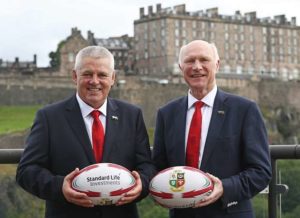
Warren Gatland and John Spencer
The 1971 and 1974 Lions were the greatest touring teams that have departed these shores, but the monopoly they appear to have on key positions in the Four Home Unions is now coming under scrutiny. The appointment of John Spencer, the 1971 Lions and England centre, as manager of the 2017 Lions is a case in point.
Spencer’s installation was not greeted with unanimous approval, and the same was true when Tom Grace, the 1974 Lions and Ireland wing, was appointed as Lions chairman.
The 1971 and 1974 Lions have rightfully had a major influence on the future of the touring side, and that has been recognised with luminaries from those sides being awarded the majority of the management, coaching and administrative roles in the intervening 40 plus years.
However, exactly how appointments are made in Lions rugby has always been shrouded in fog.
Four Home Unions appointments have always had a whiff of the clandestine about them, with vested national interests and horse-trading to the fore. As a result, in the professional era they have been a mixed bag.
Of the tour managers, Fran Cotton added to his credentials as one of the great Lions by bringing his experience and savvy to bear strongly for the series-winning 1997 tourists in South Africa, and Gerald Davies (South Africa 2009) and Andy Irvine (Australia 2013) commanded respect on their tours.
Donal Lenihan (Australia 2001) and Bill Beaumont (New Zealand 2005) found the going much tougher, with disgruntled midweek players breaking ranks in 2001, and the new-fangled Clive Woodward model going up in smoke in 2005.
The credentials of 1971 and 1974 greats like Cotton, Davies and Irvine are unquestionable, but it was a reasonable assumption that after their stints as Lions managers the 1971/74 generation would pass the baton on to those Lions squads from 1983 onwards, with the likes of John Rutherford, Finlay Calder, Mike Teague, Ieuan Evans, Gavin Hastings, Peter Winterbottom, Ben Clarke, Jeremy Guscott, Keith Wood, Martin Johnson, Paul Wallace and Scott Quinnell among a host of candidates.
Instead, one of the problems that the Lions face in administrative terms is that the class of 71 and 74 keep going on…and on. Questioning whether this is right is not part of an ageist agenda, it is simply that with the Lions tours scheduled only every four years the honours should be spread more evenly, especially now that managers are handsomely remunerated.
It is also a matter of record that Spencer, who will be 70 the month after the 2017 tour ends, is by far the oldest Lions manager in the professional era. Cotton (49), Lenihan (40), Beaumont (52), Davies (63), and Irvine (60) were much younger than Spencer, and it should be remembered that the Lions tours, with constant travel and administrative demands, are taxing physically and mentally.
Spencer has just spent five weeks in hospital after picking up a bacterial infection in a replaced knee joint while visiting New Zealand. The joint has had to be replaced again, and it has ruled out Spencer from joining Lions head coach Warren Gatland on his current preparatory trip to New Zealand.
That is not ideal either for Spencer, or for the Lions, especially given his response at Gatland’s unveiling as head coach in Edinburgh this week, when asked whether he intended to be hands-on as Lions manager.
“Yes, definitely, more hands-on – and the buck stops with the manager, who makes the principal decisions,” Spencer said.
He added that he would be a stickler for squad discipline, and rebutted the notion that players of his generation – who played 46 years ago and have scant experience of the changes introduced in the professional game – lack the detailed knowledge required for the job.
Spencer said that the Lions board – on which he and Grace sit alongside Irvine and Davies – would encourage the involvement of younger Lions like the 1997 and 2001 captain, Martin Johnson, although he noted that many of them were prevented by their role as commercial ambassadors.
Spencer also raised concerns over their administrative credentials. “I’m not sure all those people have management skills. I seem to remember there were a lot of people who weren’t happy with Martin’s coaching skills at one stage.”
It is unfortunate that Spencer, Grace and company were not as hard-hitting when they allowed New Zealand’s administrators to bounce them into an itinerary which gives the Lions virtually no preparation time, with the first tour match coming a week after the Premiership and Pro12 finals.
therugbypaper
Fascinating how touring results have made or break players.
I’ve got a intriguing book called ‘Old Heroes’ written about the 1956 springboks and all blacks.
Players where followed up and interviewed 30 years later.
Main theme is that the All Blacks victors became heroes and leaders in society and the development of the game in NZ.
In contrast the Springbok losers were ostracized with a lot ending up with broken lives and discarded by the rugby fraternity.
Same thing in the UK it seems. Those 1971 and 1974 Lions players are like ‘gods’.
@ McLook: Do you have the author of the book and who published it?
Do you have the author of the book and who published it?
Very valid thoughts McLook, thanks for the reference to that book it sounds like one I must get my hands on or maybe throw some hints for Santa to bring it to me, I have been a very very good boy this year
Bullscot wrote:
Warwick Roger.
Users Online
Total 102 users including 0 member, 102 guests, 0 bot online
Most users ever online were 3735, on 31 August 2022 @ 6:23 pm